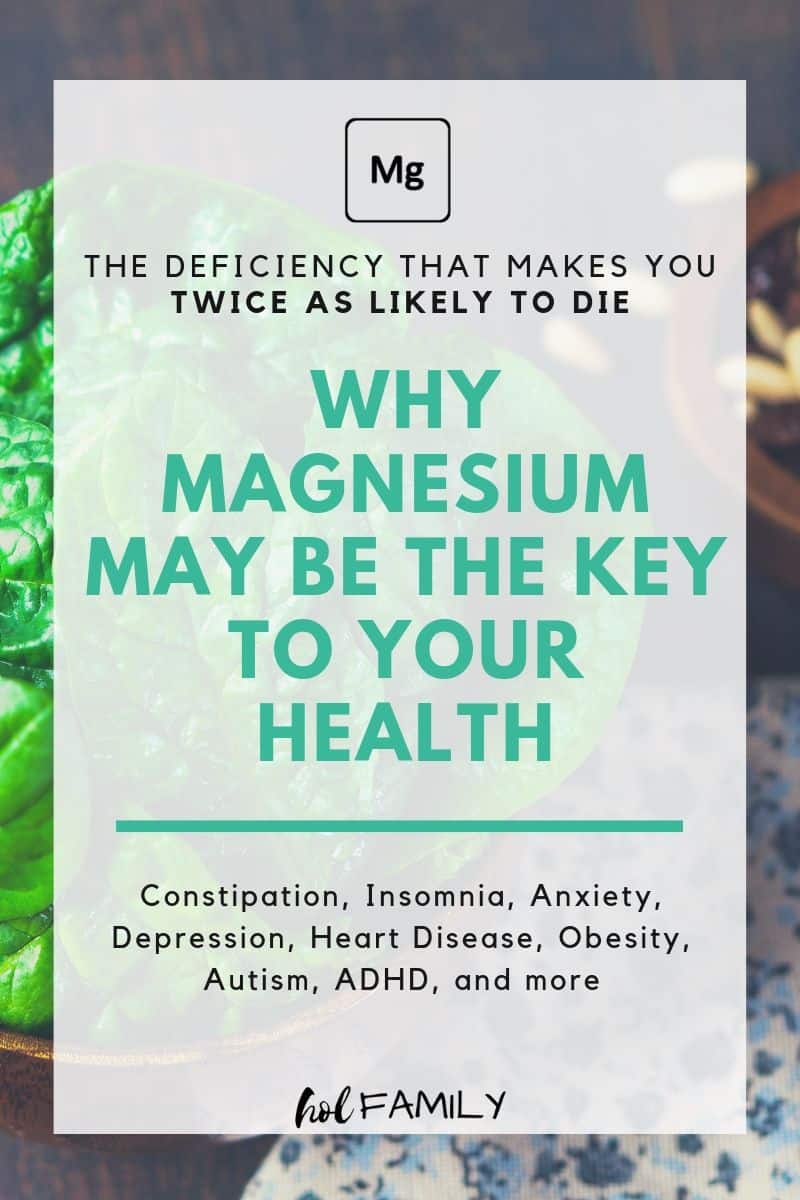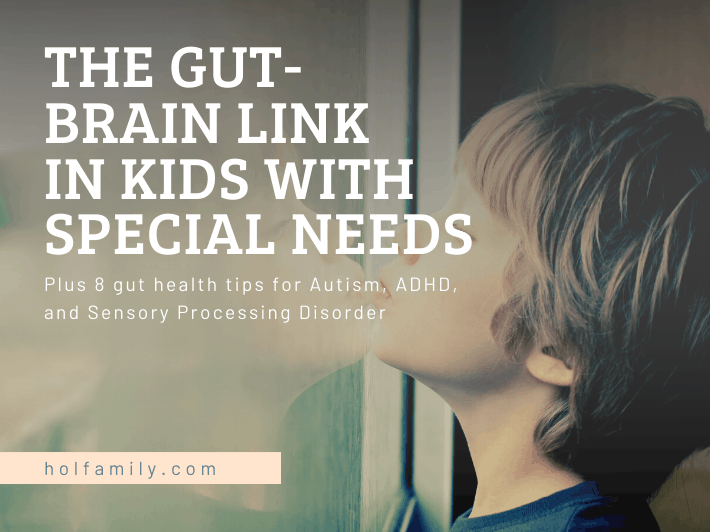
For years, I struggled with insomnia, constipation, anxiety, irritability, and frequent headaches. Like many other busy Moms, I “managed” my symptoms without ever looking into their root cause.
Headaches? No problem, I’ve got an oil for that! Insomnia? I’ll use a homeopathic remedy. Constipation? My Go-Go Gummies always do the trick!
I applauded myself for using “natural remedies” instead of harmful chemicals to fix my symptoms…until one day I realized I was taking a band-aid approach to my health.
Managing symptoms can help us get through the day, but until we address the underlying reason we have those symptoms in the first place…they’ll never go away.
It turns out that ALL of my symptoms were a result of a magnesium deficiency.
Despite a healthy diet that included lots of sources of magnesium, I was still suffering from the effects of a lack of magnesium in my body.
Keep reading to discover why most people are low in magnesium and don’t know it, the signs and symptoms of magnesium deficiency, the life-changing health benefits of magnesium, and how to use magnesium to improve your health today.
Understanding Magnesium Deficiency
According to a study published in the Journal of Intensive Care Medicine,
“being deficient in magnesium makes you twice as likely to die as other people.”
Now, consider the fact that 50-75% of people aren’t getting enough magnesium in their diet.
Most cases of deficiency go undiagnosed because 99% of magnesium in our bodies is inside our cells, making it nearly impossible to detect with a simple blood test.
The majority of the population is at risk for magnesium deficiency thanks to a steady decline in magnesium levels in soil, GMO and processed foods, chronic disease, medications, and so much more.

Magnesium levels can also be impacted by things like excess coffee, alcohol, phosphoric acid in sodas, profuse sweating, strenuous exercise, diarrhea, menstruation, pregnancy, breastfeeding, increased stress, diuretics, antibiotics, excess calcium, intestinal parasites, and more (2).
Unfortunately, eating a healthy diet isn’t enough. Magnesium is poorly absorbed and easily lost.
The levels of magnesium found in food have decreased dramatically since the 1950’s, and food processing removes what little magnesium may have been remaining.
Magnesium deficiency increases inflammation and inflammatory markers like CRP in the body.
A deficiency in this critical nutrient also increases the risk for many chronic diseases as well as cardiac disease.
Even a mild deficiency that may not be detectable by blood test could lead to a whole range of health issues including depression, high blood pressure, osteoporosis, and more.
Magnesium: The Missing Link for Autism and ADHD
Another major problem with magnesium deficiency is that glutathione (the body’s primary antioxidant) requires this mineral for its synthesis.
This means that without enough magnesium, we don’t make enough glutathione, eventually leading to oxidative stress.
Oxidative stress makes us more vulnerable to damage by harmful chemicals, heavy metals, and many other toxins.
Numerous studies have found that children with Autism, ADD/ADHD and related disorders are more prone to magnesium deficiency and that magnesium supplementation can improve symptoms such as restlessness, hyperactivity, body rocking, poor concentration, noise sensitivity, and fidgeting (3, 4, 5, 6, 7).

In some cases, children diagnosed with ADHD may in fact be misdiagnosed when their symptoms are actually caused by an underlying magnesium deficiency.
For those with Autism, magnesium deficiency could be the link between low levels of glutathione and increased sensitivity to toxic heavy metals.
Signs and Symptoms of Magnesium Deficiency
- Aggression
- Anxiety
- Angina
- Arrhythmias
- Asthma
- Autism and ADHD
- Cardiac Disease
- Cataracts
- Chronic Fatigue
- Confusion
- Constipation
- Cramps
- Depression
- Diabetes
- Fibromyalgia
- Headaches/Migraines
- High Blood Pressure
- IBS
- Insomnia
- Irritability
- Kidney Stones
- Muscle weakness, twitching, tremors
- Obesity
- Osteoporosis
- Palpitations
- Photosensitivity
- PMS
- Restless Leg Syndrome
- Reflux
- Ringing in the Ears
- Sensitivity to Loud Noises
The Life-Changing Health Benefits of Magnesium
Magnesium is necessary for the function of over 300 enzymes in the body with 90% of total body magnesium being found in the muscles, bones and brain.
This important nutrient is required for cells to be able to make energy, for proper functioning of chemical pumps, to stabilize membranes, and for muscle relaxation.
Magnesium is so powerful that it plays a very important role in medicine for treating conditions like migraines, constipation, asthma, arrhythmias, dyspepsia, preeclampsia, and preterm labor (8).
Magnesium can help to reduce inflammation, prevent chronic disease, and improve mental health conditions including anxiety, depression, Autism and ADHD.

There is even promising research showing that magnesium may help to improve symptoms related to metabolic syndrome and obesity, improving glucose and insulin metabolism (9).
Magnesium has a calming effect on the body, helping to gently alleviate symptoms like headaches, insomnia, constipation, menstrual cramps, teeth grinding, restless leg syndrome, and so much more.
The list of positive health benefits for magnesium could go on and on, but clearly almost every human being can benefit from increased magnesium.
How to Use Magnesium to Improve Your Health Today
Dietary sources of magnesium include foods like nuts, leafy greens, some grains, beans, tofu, avocado, garlic, shrimp, and sea vegetables.
Unfortunately, soil erosion and decreasing bioavailability of magnesium in food means that even diets including these items may still be suffering from deficiency.

The reliance on genetically modified crops and chemical laden processed foods has also led to the current magnesium crises we now see in western cultures.
Choosing to eat organic foods does increase the amount of available minerals, including magnesium, but most diets don’t include enough food sources to meet the minimum requirements for health.
Luckily, there are other ways to get the recommended minimum amount of 300 mg a day (beware some people may benefit from higher intakes levels up to 1,000 mg a day but always speak with your trusted health practitioner before taking any supplements).
Oral magnesium supplements in the form of capsules or powders are readily available and affordable.
The best forms to look for are magnesium citrate, glycinate, aspartate, taurate, or chelated forms as these are the most easily absorbed.
Diarrhea is a common side effect of magnesium but can be avoided by switching to the glycinate form. On the other hand, magnesium can be a safe and gentle way to treat constipation.
For those who struggle with poor absorption due to conditions like IBS or leaky gut, transdermal (through the skin) magnesium can be an excellent option.
Epsom salt baths, magnesium oil spray, and magnesium lotion can all be great ways to get the benefits of increased magnesium without having to take an oral supplement.
For an easy DIY magnesium lotion recipe that is safe even for your little ones, check out this post on how to make a homemade calming magnesium lotion.
For kids, you can also try these bedtime bears, which have magnesium and tart cherry juice for calming and improving sleep quality!
The Bottom Line
Every cell in the body requires magnesium to be able to function and do its job.
Two of our most important organs – the brain and the heart – require the most magnesium, making them especially vulnerable to deficiency.
We depend on magnesium for balancing our hormones, keeping our bones and teeth strong, maintaining healthy vitamin D levels, and so much more.
Magnesium really is a MIRACLE MINERAL.
Have you tried taking magnesium for your health? Leave us a comment below and let us know!












